- Faculties Publish an Insightful Article on Political Manifestos and Labor Class May 29, 2024
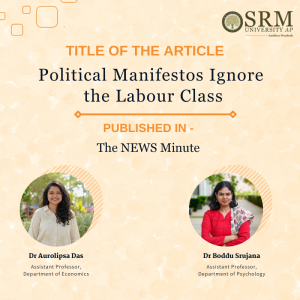 In a thought-provoking article titled “Political Manifestos Ignore the Labor Class,” Dr Aurolipsa Das and Dr Srujana Boddu, Assistant Professors from the Department of Economics, shed light on a critical issue that often goes unnoticed during election seasons. Their research delves into the disconnect between political promises and the ground realities faced by the labour class.
In a thought-provoking article titled “Political Manifestos Ignore the Labor Class,” Dr Aurolipsa Das and Dr Srujana Boddu, Assistant Professors from the Department of Economics, shed light on a critical issue that often goes unnoticed during election seasons. Their research delves into the disconnect between political promises and the ground realities faced by the labour class.They critically examine the shortcomings of political manifestos, highlighting how they often overlook the interests and needs of the labour class. As India heads into another election cycle, Dr Aurolipsa Das and Dr. Srujana’s article serves as a wake-up call for policymakers. To bridge the gap between political promises and ground-level impact, evidence-based policies that prioritise the labor class are essential. It is time for political parties to move beyond rhetoric and take concrete steps toward meaningful progress.
Read the full article by clicking on this link to gain deeper insights into this crucial topic.
Continue reading → - Uncovering the Factors Influencing Income Inequality in Rural Indian Households: A Comprehensive Study May 1, 2024
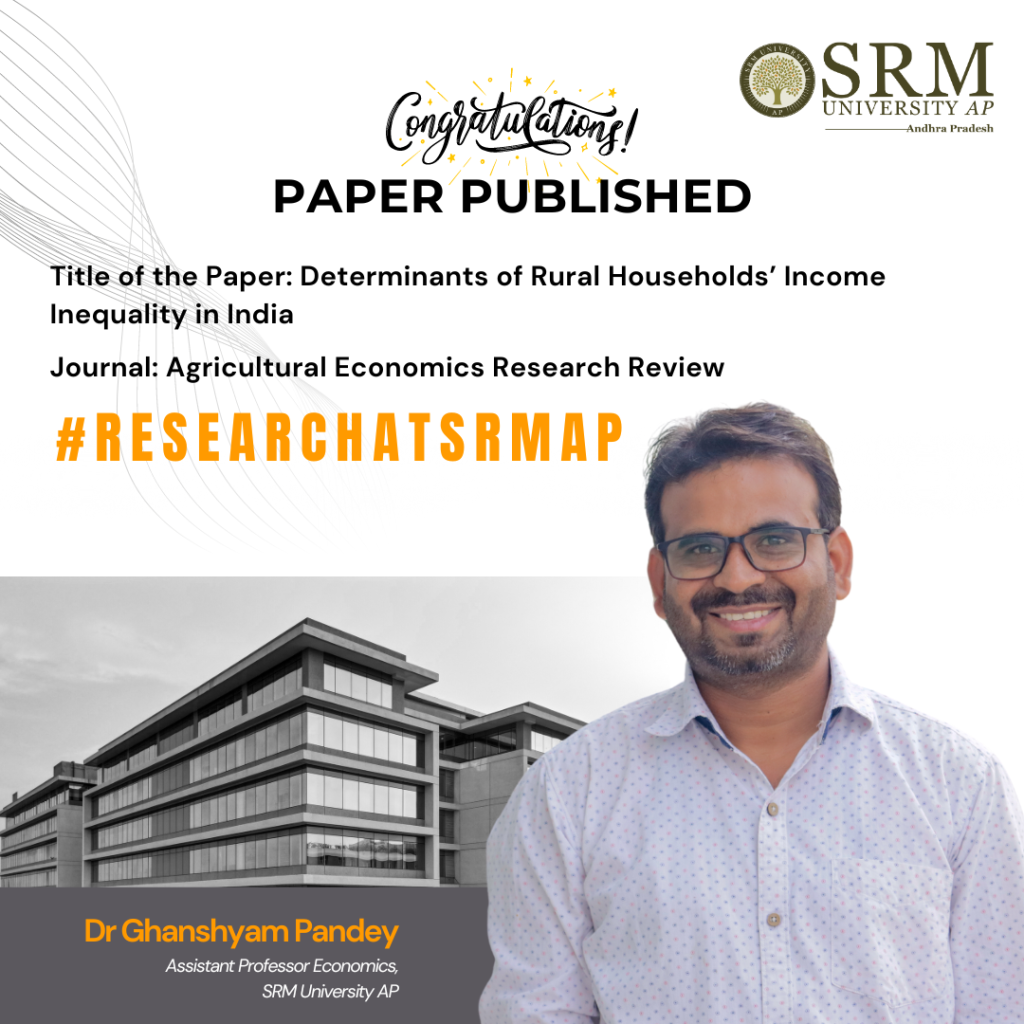
The Department of Economics takes immense pride in announcing the publication of the research paper, “Determinants of Rural Households’ Income Inequality in India” authored by Dr Ghanshyam Pandey, Assistant Professor. The paper has been published in the Journal of Agricultural Economics Research Review (ABDC-C), and has an impact factor of 0.19. Dr Pandey’s paper examines the factors that determine income inequality among rural farm households in India and discusses the implications of the findings for policymakers, practitioners, and researchers. The study highlights how addressing the identified factors could potentially reduce income inequality among rural farm households and improve the overall well-being of the rural population.
Abstract
This study has identified the drivers of income inequality in rural India using IHDS 2011–12 national-level survey. The inequality decomposition methodology developed by Fields (2003) based on a two-way regression methodology has been used. The study has modified the previous regression based inequality decomposition technique by accounting for diverse income sources and regimes as well as by effectively correcting for selectivity in the various income regimes. The CLAD model has been used to distinguish the determinants of income inequality in rural India. The study has indicated that income inequality in farm households can be attributed to the level of education, family size, caste/social group composition, and composition in land ownership and that family size and land ownership are instrumental primarily due to off-farm labour income. The study has shown that education is a significant factor in income inequality due to its impact on off-farm work income. The study has suggested that a continued increase in variability in land distribution may exacerbate income inequality in households in rural India.
Link to the Article
Pandey G and Devi B (2023). Determinants of rural households’ income inequality in India. (2024). Agricultural Economics Research Review, 36(2), 213-225. https://epubs.icar.org.in/index.php/AERR/article/view/150669
Continue reading →
- Examining the Impact of Bifurcation on Agricultural Development in Jharkhand: A Comprehensive Study April 16, 2024
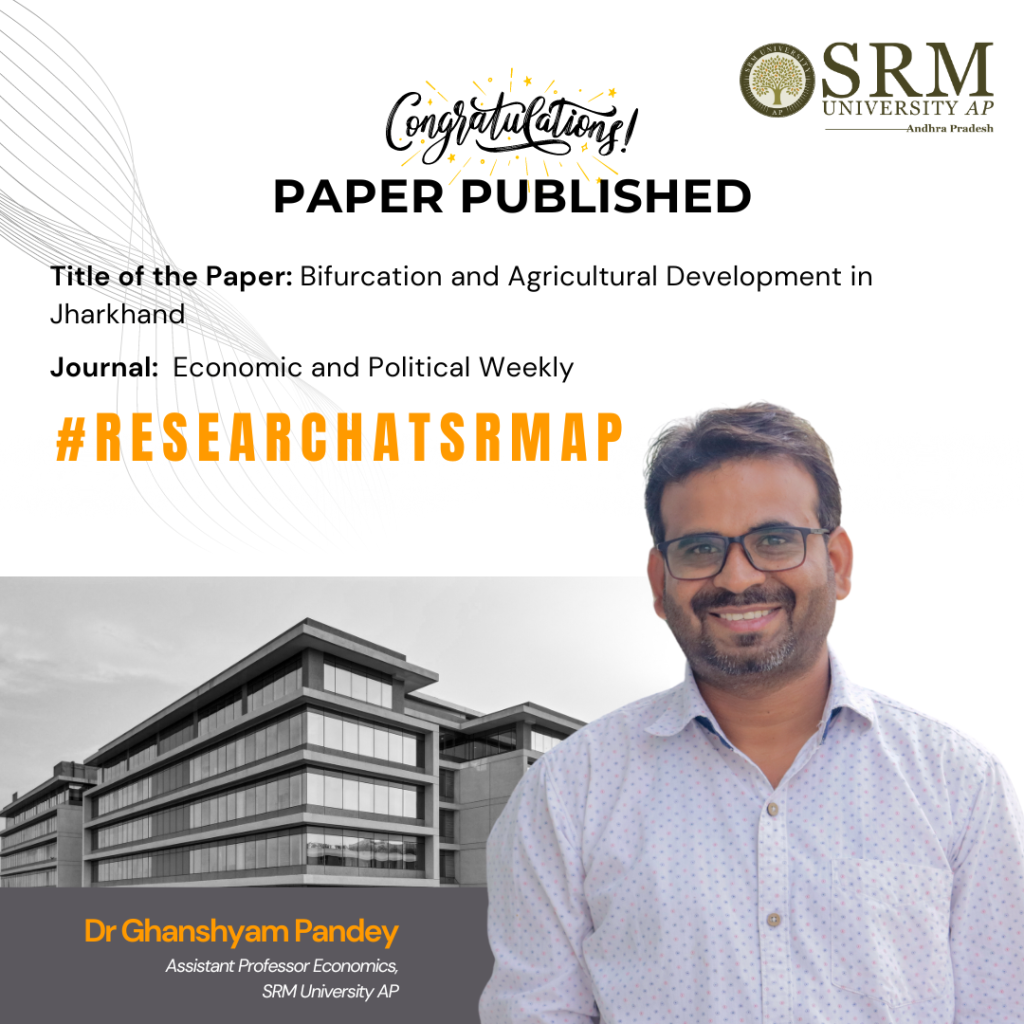
The Department of Economics is thrilled to announce the publication of Assistant Professor Dr Ghanshyam Kumar Pandey’s research paper titled, “Bifurcation and Agricultural Development in Jharkhand,” in Economic and Political Weekly. The paper delves into the developmental trajectory of Jharkhand following its bifurcation from Bihar in 2000 and examines the intricacies of agricultural development and the key determinants that have shaped its evolution post-separation.
Abstract:
The cropping pattern in Jharkhand has significantly changed from 2000 to 2016, with shifts from the cultivation of cereals to non-cereals. An increase in the crop area and diversification towards high-value crops have accelerated overall agricultural growth. Capital formation and better infrastructure facilities, along with improved fertiliser consumption and irrigation, will foster agricultural development in Jharkhand
Practical implementation:
This study shows the development path of Jharkhand after bifurcation from Bihar in 2000. The study deals with the process of agricultural development and determinants of agricultural development after its bifurcation.
Continue reading →
- Dr Ghanshyam Pandey Invited as Guest Speaker at BITS Pilani, Goa January 24, 2024
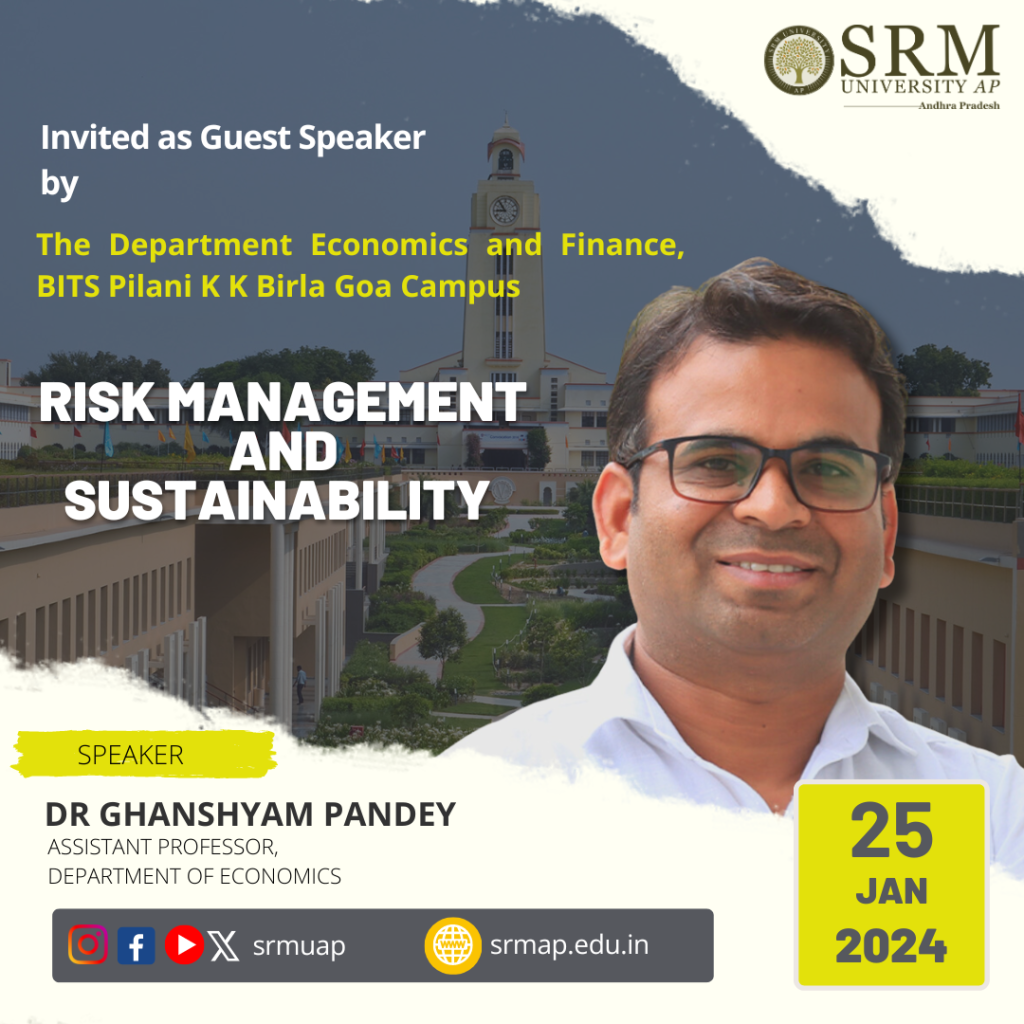
Dr Ghanshyam Pandey, an Assistant Professor at the Department of Economics, has been invited to deliver a talk on Risk Management and Sustainability on January 25, 2024, at the Department of Economics and Finance, BITS Pilani K K Birla Goa Campus.
Dr Pandey is a distinguished member of SRM University-AP’s teaching faculty and an accomplished economist with numerous publications to his credit. He has led several prestigious government-sponsored projects and is the Principal Investigator for the NABARD-sponsored project titled, “Tenancy and Credit: Exploring Facts below the Crust in AP”.
Continue reading → - Understanding the Inflation-Unemployment Dynamics in Canada January 22, 2024
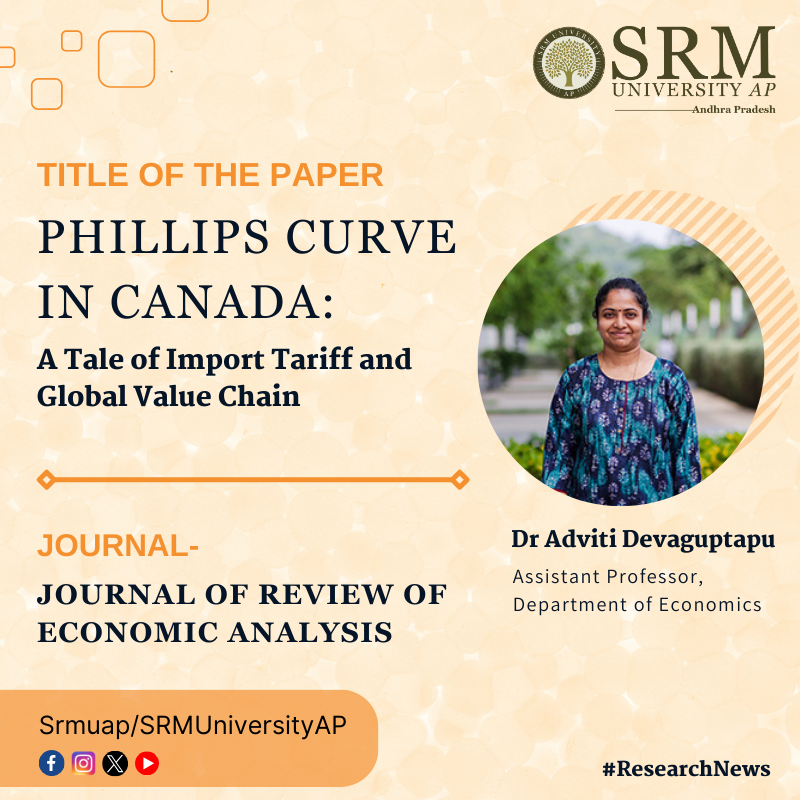
The rate of inflation has been termed to be directly proportionate to economic activity, with the increase in economic activity leading to higher levels of inflation. Central Banks have used this relationship to formulate interest rates and understand the inflation–unemployment dynamics in many countries. Dr Adviti Devaguptapu, Assistant Professor from the Department of Economics, has published an interesting study in her paper titled “Phillips Curve in Canada: A Tale of Import Tariff and Global Value Chain”, where she examines the relationship between inflation-economic activity in Canada to better understand the correlation between inflation and unemployment rates.
Abstract
The paper examines the Phillips curve for Canada from June 1976 to October 2022 in a time-varying manner. The findings reveal that the impulse response of inflation to the changes in the unemployment rate gap has reduced over time till 2010 and strengthened thereafter. The response of inflation to the changes in the unemployment rate gap has increased in short and medium horizons after 2010. On further examination, it is found that the changes in both average import tariff and forward participation in the global value chain have reduced the inflation response to the changes in the unemployment rate gap.
Social Implications of the Research
Inflation-targeting central banks should have to put more (less) effort into achieving price stability in the medium run when the change in the level of inflation to the changes in the unemployment rate gap is more (less).
Dr Adviti’s research works towards developing quality-adjusted inflation in India – the need for it and the challenges in recording it.
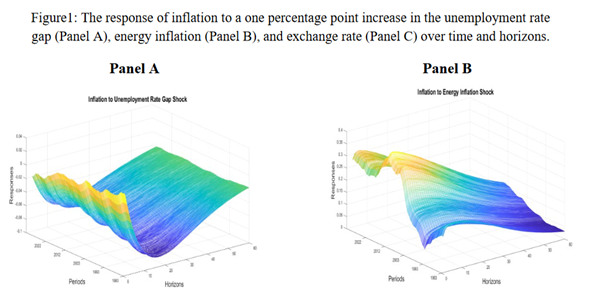
Link to the article
Continue reading →
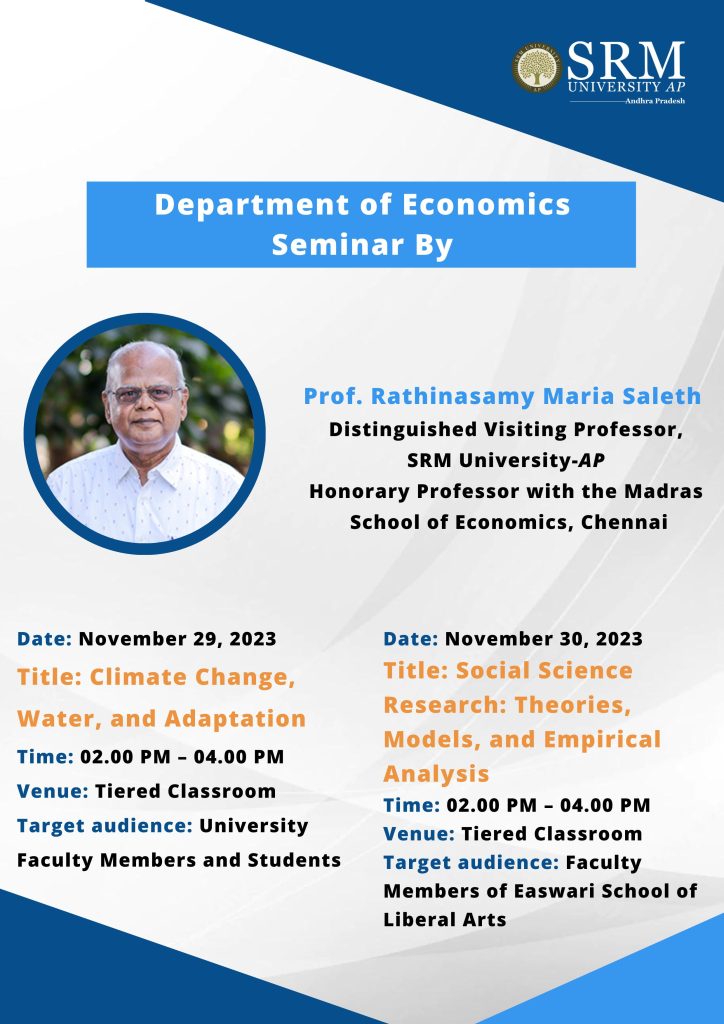
The Department of Economics is inviting Distinguished Visiting Professor, Prof. Rathinasamy Maria Saleth for two esteemed seminars on novel topics of social relevance. Prof. Saleth will talk on “Climate Change, Water, and Adaptation” on November 29, 2023, and “Social Science Research: Theories, Models, and Empirical Analysis” on November 30, 2023.
Join the sessions and gain insights from the seasoned academician!
About the Speaker
Prof. Rathinasamy Maria Saleth is currently a Distinguished Visiting Professor at the Department of Economics, Easwari School of Liberal Arts, SRM University-AP. He is regularly affiliated as an Honorary Professor at the Madras School of Economics, Chennai.
Prof. Saleth received his MA from Madurai Kamaraj University, Madurai (1979), MPhil from Jawaharlal Nehru University, New Delhi (1981), and PhD from University of Illinois, Urbana-Champaign, USA (1989). He works in the areas of water resource management, institutional change, development policy, and impact assessment and has published three books, six edited volumes, and over 100 research papers in journals and edited volumes related to these areas.
Prof. Saleth has also won awards for some of his papers, books, and works from professional organisations such as the Indian Society of Agricultural Economics, the American Water Resources Association, the International Water Association, and the University of South Australia. He has also been a consultant to the World Bank, Food and Agriculture Organisation, Asian Development Bank, UN Economic and Social Council for the Asia and the Pacific, and UN Environment Programme.
Talk 1: Climate Change, Water, and Adaptation
Abstract: This presentation covers the nature and magnitude of the impacts of climate change on water resources and possible coping and adaptation options both from global and national perspectives. The presentation starts with a discussion on the leading causes of climate change, especially the cumulative effects of global warming caused by greenhouse gases and related environmental consequences from human-induced economic activities and ecological disturbances. It, then, shows how the impacts of climate change are manifested both at the global and national scale in terms of the spatial and temporal patterns of precipitation and water availability and the resultant implications for water, agriculture, and economy. Although climate change is caused essentially by non-hydrological factors, the water sector continues to be the main medium through which most of its impacts are transmitted to the agricultural sector in particular and other economic sectors in general. As such, it is but natural for the adaptation/coping strategies also to be designed at the point of the impacted sectors, though, admittedly, general mitigation strategies go far beyond these sectors. The presentation, finally, concludes by delineating feasible adaptation strategies for the water sector, which include not just demand management options but also supply management avenues, especially those involving institutional changes and infrastructural developments.
Talk 2: Social Science Research: Theories, Models, and Empirical Analysis
Abstract: This presentation covers the theoretical, methodological, and empirical aspects of social science research, especially from the perspective of young research scholars. It starts with a discussion on the nature, rationale, features, and types of building blocks of social science theories. After an analytical description of three broad types of models, i.e., simple, interactive, and path-based models, the presentation provides concrete illustrations, particularly for the interactive and path-based models using a few empirical case studies. These illustrative case studies will show how to conceptualize, operationalize, and empirically evaluate the research problems in different contexts. The presentation, finally, concludes with the discussion on some of the additional methodological, practical, and data-related aspects of importance in social science research.
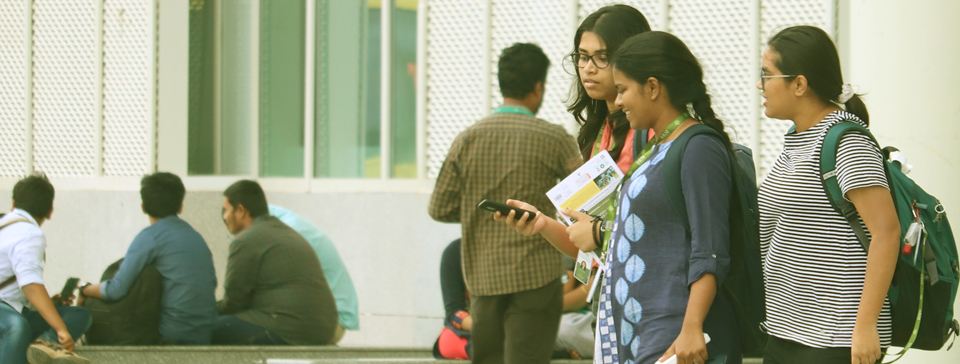
Pandey, G. (2020). “Sources and Drivers of Agricultural Growth in Jharkhand” Paper is awarded with Gold medal on Research Day at SRM University held on 29th January 2020.
Articles
Dr Ghanshyam Pandey - Budget 2023-24 is not a complete package for the Agricultural sector
Prof Balaji Vejju - Union Budget 2023: A big push for MSME sector development
Dr Manozor Hassan - Budget 2023-24 And India’s Imports, Exports, And Current Account Deficit
Md Murtaza & J vineesh Prakash - Is Gobardhan Scheme A Lasting Solution To Stubble Burning?

